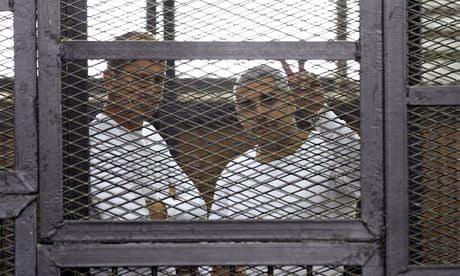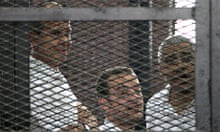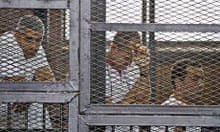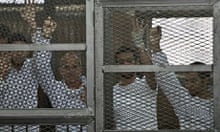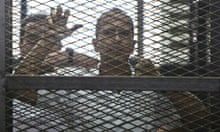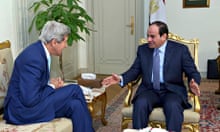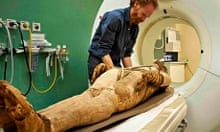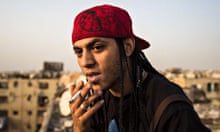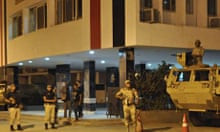The judge presiding over the trial of three al-Jazeera journalists in Egypt temporarily ejected all reporters from the court after a chaotic session in which he admitted he could not understand several audio recordings presented as key prosecution evidence.
Prosecutors played several recordings that they claimed were of conversations between students charged alongside the journalists. But the recordings were all but inaudible – and the judge, Mohamed Nagy, was forced to admit that he could not make out what was being said.
"If anyone understands," Nagy announced at one point, "please let us know, because we don't understand either."
In later recordings, Nagy claimed his hearing had improved – but most present could not make out more than a few phrases at any point, prompting renewed doubts about the strength of the prosecution's case.
Mohamed Lotfy, the co-founder of the Egyptian Commission for Rights and Freedoms, who attended the session, said: "It begs the question: how can you show this as evidence, if nobody can make sense of it?"
The trial centres on three journalists who worked for al-Jazeera English – Australian reporter Peter Greste, Canadian-Egyptian bureau chief Mohamed Fahmy, and local producer Baher Mohamed. They have been detained since December on charges of smearing Egypt's reputation, doctoring footage, and helping terrorists.
Around the world, the case has been portrayed as an attack on press freedom. But inside Egypt, many feel the trial is justified because of the perception that al-Jazeera, and particularly its Arabic wing, is biased against the Egyptian government.
On trial with the journalists are several students who have no links to al-Jazeera, and who say they do not understand why they are involved in the case.
The inaudible recordings played at Tuesday's session followed videos presented during a previous hearing this the month in which prosecutors used footage of a trotting horse from Sky News Arabia and a documentary about Somalia from the BBC's Panorama as evidence for the al-Jazeera journalists' guilt.
In Tuesday's session, prosecutors focussed on footage from al-Jazeera, which they said had been taken from the journalists' possession. Several al-Jazeera English presenters featured – among them a few short, videos of Greste – and the footage included several interviews with Muslim Brotherhood members and supporters. But the selection still appeared random and unprepared, and included numerous sequences of discarded footage, as well as an interview about sheep farming.
Defence lawyers repeatedly questioned the relevance of the footage, and the diligence of the prosecutors in presenting it in court. Fahmy's lawyer, Khaled Abou Bakr, asked the judge: "Can we put the sheep aside and bring what is relevant to case? This is a waste of time."
Shouting from the defendants' cage, Fahmy said the rushes were of the kind many Egypt-based journalists would have in their possession, and questioned why footage made before September 2011, when he joined al-Jazeera, was being used to incriminate him.
"Every journalist has this on their computer," said Fahmy. "Why is this used as evidence?"
Prosecutors also displayed images, notes and maps they claim were taken from the students' phones, the relevance and exact provenance of which was not specified.
Egyptian officials have repeatedly asked critics to respect the independence of Egypt's judiciary, maintaining that the trial is fair and transparent. But the transparency of proceedings came under threat halfway through the session, when the judge ordered reporters to leave for an hour, after some photographers took pictures during a recess.
"It reflects the absurdity of the situation," said Lotfy. "It's a trial that shouldn't exist, and journalists shouldn't have to be here in the first place – and they're still kicked out."
The trial continues.
